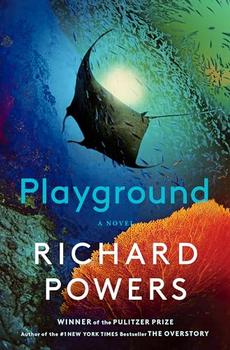Summary | Excerpt | Reading Guide | Reviews | Beyond the book | Read-Alikes | Genres & Themes | Author Bio

A Novel
by Richard PowersThe primary narrator of Richard Powers' latest novel, Playground, is Todd Keane, who at 57 years old has recently been diagnosed with Lewy body dementia, a degenerative disease that affects thinking, memory, and movement. Addressing his account to an unidentified "you," Todd wants to relay "the story of my friend and me and how we changed the future of mankind" before his disease overwhelms him. That friend is Rafi Young, a fellow wunderkind with whom he bonded in high school over games of Go; Todd then went on to build an insanely popular social media platform called Playground. It's this linear storyline that forms the backbone of this complex, multilayered tale.
Weaving around this storyline, like the threads of a fine tapestry, are several other compelling plotlines. One centers on the French Polynesian island of Makatea, whose 82 residents have just weeks to decide between maintaining their lifestyle in harmony with nature or embracing a technological future that they're told will bring an economic boom. Another narrates the experiences of Evelyne Beaulieu, a French Canadian diver who's spent most of her life studying the wonders of the ocean. Still another unfolds around Ina Aroita, a Pacific Islander who creates sculptures from plastic and other trash disgorged by the polluted ocean. As the narrative jumps unpredictably back and forth through time and space, Powers explores diverse themes such as friendships gained and lost; humanity's impact on the planet, especially its oceans; neocolonialism; sexism in the sciences; the development and future of artificial intelligence; and many others.
If this all makes it sound like Playground is dense and complicated, there's a reason for that. But Powers' genius is his ability to form a cohesive and absorbing narrative from what at first seems to be a disorienting, unrelated mishmash of ideas. And as always, his writing is luminous. When 10-year-old Todd finds inspiration in a book about the ocean, for example, Powers writes:
"The book sparked endless living experiments inside my head. Every page animated the incalculably large and inexplicably bizarre universe beneath the ocean's surface. Each sentence was a blue-black mystery populated by creatures more fantastic than any role-playing dungeon crawl."
Later, the author describes Evelyne writing the book that will ultimately be read by Todd:
"She wrote of swimming at night in the black, warm water of the South China Sea, when every paddle of her limbs triggered a swirling Milky Way of animals flashing blue and white. Three-quarters of ocean species, from zooplankton to giant squid, were signaling in a language of living light."
Such lush descriptions populate much of the novel; the reader can sense Powers' own childlike wonder at the undersea world. The novel is filled, too, with interesting trivia about the ocean—like how a leatherback turtle "must cry two gallons of water every hour, just to keep its blood less salty than the sea"—and tidbits of history, like a description of how phosphate mining impacted Makatea in the first half of the 20th century.
Playground's characters are richly drawn; even minor characters have a life of their own. Particularly interesting are the Makatean characters, such as a woman named Palila Tepa, whom the islanders call the Queen, who has memorized over a thousand songs about the island's ancient history, and Mayor Didier Turi, who simply wants everyone to like him and is baffled by the changes he's forced to oversee.
The narrative's intricacy and non-linear format did make Playground difficult to get into at first; it was a good forty pages before I was truly sucked in (after which I couldn't put it down). The novel's disjointedness may make it a challenging read for some. That said, it is unquestionably worth the effort.
At one point in Playground, Evelyne thinks that she'd like to write a book: "To try one more time to make the land dwellers love the wild, unfathomable God of waters. To give the smallest hint of creatures so varied and inventive and otherworldly that they might compel humility and stop human progress in its tracks with awe." One feels this, too, is the heart and the goal of Playground. And for this reader, mission accomplished.
![]() This review
first ran in the October 2, 2024
issue of BookBrowse Recommends.
This review
first ran in the October 2, 2024
issue of BookBrowse Recommends.

If you liked Playground, try these:

by Fernanda Trias
Published 2025
Winner of the Uruguayan National Literature Prize for Fiction, the Bartolomé-Hidalgo Fiction Prize, and the Sor Juana Inés de la Cruz Literature Prize.

by Colum McCann
Published 2025
A propulsive novel of rupture and repair in the digital age, delving into a hidden world deep under the ocean—from the New York Times bestselling author of Apeirogon and Let the Great World Spin.
Finishing second in the Olympics gets you silver. Finishing second in politics gets you oblivion.
Click Here to find out who said this, as well as discovering other famous literary quotes!
Your guide toexceptional books
BookBrowse seeks out and recommends the best in contemporary fiction and nonfiction—books that not only engage and entertain but also deepen our understanding of ourselves and the world around us.